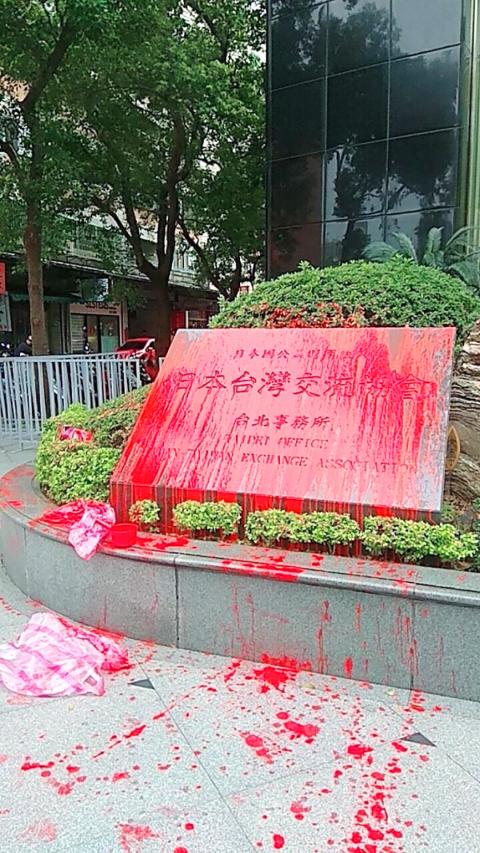The doorplate of Japan’s de facto embassy was yesterday targeted by a pro-unification supporter, who plastered it with red paint to protest against Tokyo’s controversial chasing of a Taiwanese fishing boat over the weekend.
At about noon yesterday, China Unification Promotion Party (CUPP) local chapter director Chen Ching-feng (陳清峰) hurled red paint over the doorplate of the Japan-Taiwan Exchange Association’s Taipei office, while allegedly shouting: “Come out you damn Japanese” in Mandarin.
Chen was arrested and taken to the Taipei Police Department’s Songshan Precinct for questioning.

Photo courtesy of a reader
Japanese patrol boats on Saturday and Sunday chased Taiwanese fishing vessel Tung Pan Chiu No. 28 in waters near the disputed Diaoyutai Islands (釣魚台) and used water cannon against it on Sunday, allegedly because the vessel went beyond a designated zone for fishing activities stipulated by a 2013 Taiwan-Japan Fisheries Agreement.
The government has questioned the need for Tokyo to conduct hot-pursuit tactics and lodged a stern protest with Tokyo over what it called a “disproportionate enforcement of the law.”
CUPP member Lee Cheng-lung (李承龍) told reporters that Chen was indignant at the inappropriate treatment of Taiwanese fishermen and the government’s lukewarm reaction.
“Several officials in President Tsai Ing-wen’s (蔡英文) administration, including Council of Agriculture Minister Lin Tsung-hsien (林聰賢), Representative to Japan Frank Hsieh (謝長廷) and Kaohsiung Mayor Chen Chu (陳菊), are currently in Japan, but they have all demonstrated incompetence in the wake of the incident,” Lee said.
Chen Chu, Lin and officials from five Democratic Progressive Party-governed cities and counties left for Japan on Sunday to promote Taiwanese food products.
They are due to return today.
Chen Ching-feng believed the dignity of Taiwanese had been undermined by the incident, and he wanted to express his and the public’s grievances, Lee said.
The Ministry of Foreign Affairs issued a statement expressing regret over the incident and adding that it had asked the National Police Agency to increase patrols to prevent a recurrence.
It also urged the public to refrain from taking violent or irrational action against foreign representative offices, as it could tarnish the nation’s international image and damage its interests.

MISINFORMATION: The generated content tends to adopt China’s official stance, such as ‘Taiwan is currently governed by the Chinese central government,’ the NSB said Five China-developed artificial intelligence (AI) language models exhibit cybersecurity risks and content biases, an inspection conducted by the National Security Bureau (NSB) showed. The five AI tools are: DeepSeek, Doubao (豆包), Yiyan (文心一言), Tongyi (通義千問) and Yuanbao (騰訊元寶), the bureau said, advising people to remain vigilant to protect personal data privacy and corporate business secrets. The NSB said it, in accordance with the National Intelligence Services Act (國家情報工作法), has reviewed international cybersecurity reports and intelligence, and coordinated with the Ministry of Justice Investigation Bureau and the National Police Agency’s Criminal Investigation Bureau to conduct an inspection of China-made AI language

LIMITS: While China increases military pressure on Taiwan and expands its use of cognitive warfare, it is unwilling to target tech supply chains, the report said US and Taiwan military officials have warned that the Chinese People’s Liberation Army (PLA) could implement a blockade within “a matter of hours” and need only “minimal conversion time” prior to an attack on Taiwan, a report released on Tuesday by the US Senate’s China Economic and Security Review Commission said. “While there is no indication that China is planning an imminent attack, the United States and its allies and partners can no longer assume that a Taiwan contingency is a distant possibility for which they would have ample time to prepare,” it said. The commission made the comments in its annual

CHECKING BOUNDARIES: China wants to disrupt solidarity among democracies and test their red lines, but it is instead pushing nations to become more united, an expert said The US Department of State on Friday expressed deep concern over a Chinese public security agency’s investigation into Legislator Puma Shen (沈伯洋) for “secession.” “China’s actions threaten free speech and erode norms that have underpinned the cross-strait ‘status quo’ for decades,” a US Department of State spokesperson said. The Chongqing Municipal Public Security Bureau late last month listed Shen as “wanted” and launched an investigation into alleged “secession-related” criminal activities, including his founding of the Kuma Academy, a civil defense organization that prepares people for an invasion by China. The spokesperson said that the US was “deeply concerned” about the bureau investigating Shen

‘TROUBLEMAKER’: Most countries believe that it is China — rather than Taiwan — that is undermining regional peace and stability with its coercive tactics, the president said China should restrain itself and refrain from being a troublemaker that sabotages peace and stability in the Indo-Pacific region, President William Lai (賴清德) said yesterday. Lai made the remarks after China Coast Guard vessels sailed into disputed waters off the Senkaku Islands — known as the Diaoyutai Islands (釣魚台) in Taiwan — following a remark Japanese Prime Minister Sanae Takaichi made regarding Taiwan. Takaichi during a parliamentary session on Nov. 7 said that a “Taiwan contingency” involving a Chinese naval blockade could qualify as a “survival-threatening situation” for Japan, and trigger Tokyo’s deployment of its military for defense. Asked about the escalating tensions